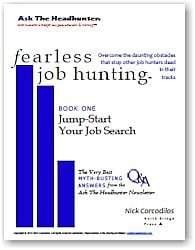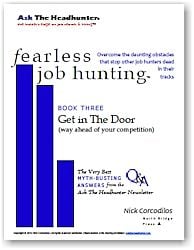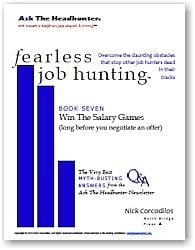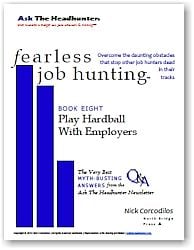In the November 26, 2013 Ask The Headhunter Newsletter, there’s no Q&A. Instead…
 I normally take a break during Thanksgiving week and skip publishing an edition of the newsletter so that I can cook, bake, and fill the larder with goodies for Thursday. But I’m cooking up something different for you with this edition. Rather than normal Q&A, I’d like to share four tips from the latest Ask The Headhunter publications. If you find something useful in them, I’ll be glad.
I normally take a break during Thanksgiving week and skip publishing an edition of the newsletter so that I can cook, bake, and fill the larder with goodies for Thursday. But I’m cooking up something different for you with this edition. Rather than normal Q&A, I’d like to share four tips from the latest Ask The Headhunter publications. If you find something useful in them, I’ll be glad.
The idea behind the new Fearless Job Hunting books is that finding a job is not about prescribed steps. It’s not about following rules. In fact, job hunting is such an over-defined process that there are thousands of books and articles about how to do it — and the methods are all the same.
What all those authors conveniently ignore is that the steps don’t work. If they did, every resume would get you an interview, which would in turn produce a job offer and a job.
But we all know that doesn’t happen. The key to successful job hunting is knowing how to deal with the handful of daunting obstacles that stop other job hunters dead in their tracks. Here are some excerpts from Fearless Job Hunting — and if you decide you’d like to study these methods in more detail, I invite you to take 20% off your purchase price by using discount code=GOBBLE. (This offer is limited until the end of the holiday weekend.)
4 Fearless Job Hunting Tips
You just lost your job and your nerves are frayed. Please — take a moment to put your fears aside. Think about the implications of the choices you make. Consider the obstacles you encounter in your job search.
 1. Don’t settle
1. Don’t settle
From Fearless Job Hunting Book 1: Jump-Start Your Job Search, p. 4, The myth of the last-minute job search:
When you’re worried about paying the rent, it seems that almost any job will do. Taking the first offer that comes along could be your biggest mistake. It’s also one of the most common reasons people go job hunting again soon — they settle for a wrong job, rather than select the right one.
Start Early: Research the industry you want to work in. Learn what problems and challenges it faces. Then, identify the best company in that industry. (Why settle for less? Why join a company just because it wants you? Join the one you want.)
Study the company, establish contacts, learn the business, and build expertise. Rather than being just a hunter for any job, learn to be the solution to one company’s problems. That’s what gets you hired, because such dedication and focus makes you stand out.
2. Scope the community
From Fearless Job Hunting Book 3: Get In The Door (way ahead of your competition), p. 6, It’s the people, Stupid:
 You could skip the resume submission step completely, but if it makes you feel good, send it in. Then forget about it.
You could skip the resume submission step completely, but if it makes you feel good, send it in. Then forget about it.
More important is that you start to understand the place where you want to work. This means you must start participating in the community and with people who work in the industry you want to be a part of.
Every community has a structure and rules of navigation. Figure this out by circulating. Go to a party. Go to a professional conference or training program. Attend cultural and social events that require milling around with other people (think museums, concerts, churches). It’s natural to ask people you meet for advice and insight about the best companies in your industry. But don’t limit yourself to people in your own line of work.
The glue that holds industries together includes lawyers, accountants, bankers, real estate brokers, printers, caterers and janitors. Use these contacts to identify members of the community you want to join, and start hanging out with them.
3. Avoid a salary cut
From Fearless Job Hunting Book 7: Win The Salary Games (long before you negotiate an offer), p. 9: How can I avoid a salary cut?
 Negotiating doesn’t have to be done across an adversarial table — and it should not be done over the phone. You can sit down and hash through a deal like partners. Sometimes, candor means getting almost personal. Check the How to Say It box for a suggestion:
Negotiating doesn’t have to be done across an adversarial table — and it should not be done over the phone. You can sit down and hash through a deal like partners. Sometimes, candor means getting almost personal. Check the How to Say It box for a suggestion:
How to Say It
“If I take this job, we’re entering into a sort of marriage. Our finances will be intertwined. So, let’s work out a budget — my salary and your profitability — that we’re both going to be happy with for years down the road. If I can’t show you how I will boost the company’s profitability with my work, then you should not hire me. But I also need to know that I can meet my own budget and my living expenses, so that I can focus entirely on my job.”
It might seem overly candid, but there’s not enough candor in the world of business. A salary negotiation should be an honest discussion about what you and the employer can both afford.
4. Know what you’re getting into
From Fearless Job Hunting Book 8: Play Hardball With Employers, p. 23: Due Diligence: Don’t take a job without it:
 I think the failure to research and understand one another is one of the key reasons why companies lay off employees and why workers quit jobs. They have no idea what they’re getting into until it’s too late. Proper due diligence is extensive and detailed. How far you go with it is up to you.
I think the failure to research and understand one another is one of the key reasons why companies lay off employees and why workers quit jobs. They have no idea what they’re getting into until it’s too late. Proper due diligence is extensive and detailed. How far you go with it is up to you.
Research is a funny thing. When it’s part of our job, and we get paid to do it, we do it thoroughly because we don’t want our judgments to appear unsupported by facts and data. When we need to do research for our own protection, we often skip it or we get sloppy. We “trust our instincts” and make career decisions by the seat of our pants.
When a company uses a headhunter to fill a position, it expects [a high level] of due diligence to be performed on candidates the headhunter delivers. If this seems to be a bit much, consider that the fee the company pays a headhunter for all this due diligence can run upwards of $30,000 for a $100,000 position. Can you afford to do less when you’re judging your next employer?
Remember that next to our friends and families, our employers represent the most important relationships we have. Remember that other people who have important relationships with your prospective employer practice due diligence: bankers, realtors, customers, vendors, venture capitalists and stock analysts. Can you afford to ignore it?
* * *
Thanks to all of you for your contributions to this community throughout the year. Have you ever settled for the wrong job, or failed to scope out a work community before accepting a job? Did you get stuck with a salary cut, or with a surprise when you took a job without doing all the necessary investigations? Let’s talk about it! And have a wonderful Thanksgiving!
If you purchase a book,
take 20% off by using discount code=GOBBLE
(This offer is limited until the end of the holiday weekend.)
: :


Doing due diligence on the employer is very important as Nick points out.
Equally important is doing due diligence on the headhunter. Here are a few questions to ask on first contact.
1. Are you contractually representing a specific employer for a specific opportunity?
Why this question is important – barriers to entry in the recruiting industry are remarkably low. Some firms collect resumes for the purpose of throwing them against the wall of job leads to see what sticks. Others have “contingent” relationships in which they have a “hunting license” for firms, but no monthly contingency fee for ongoing services. Finally, beware of firms collecting resumes for proposals (responses to RFPs) that wind up being in competition with the work / customers of the firm you work for.
2. How long have you been recruiting?
Why this question is important – do not let a 20 something have the wheel in determining where your resume goes and how it is presented especially if you are a 40 something.
Qualifying the recruiter is an important step in qualifying a job opportunity. Don’t skip it.
After some close calls, fit is now possibly the most important thing to me in the job search. I’m very picky about industry, organization, and job duties. I love telling employers yes to a job but also love feeling confident enough to tell someone no when it’s just not right.
Applying to jobs is also so time-consuming and intensive nowadays that being clear about fit ahead of time can save you a lot of trouble! It has been nice to be so clear about what jobs are appropriate for me and then dedicating all my energies to those and only those.
Alongside my journey to privileging fit is that I’ve also learned to be grateful for jobs that I didn’t get. I am able to appreciate potential employers’ foresight in knowing that I wouldn’t be right for a position or organization. Many times, I was initially bummed that I didn’t get a job; but today I feel like I dodged several bullets by not getting certain positions. In retrospect, they would likely have derailed my career permanently, or taken it in an unsatisfying direction.
@Mayor Bongo: Good reminders about headhunters, who can cause more trouble than employers. People must sometimes think I’m really down on headhunters. Who I’m down on is people who pretend to be headhunters. Unfortunately, about 95% of the “headhunter” population is phony. A good headhunter can be great for your career. But it’s up to you to vet the headhunter.
@Ian: So good to hear from someone who realizes it’s good not to get some jobs. Maybe most jobs.
Hello Nick, I stumbled onto your blog several months ago and have been a faithful reader of your wisdom ever since. However, one topic that I’ve never seen addressed — either presently or in the archives — is that of the appropriate way in which to follow up with an employer to whom one has submitted one’s application. And how, exactly, can one maximize a phone conversation if one has the actual hiring manager who is in the position to hire, not someone in HR on the phone.
Additionally, what is the etiquette surrounding said follow up phone call? Should one wait a week, or more, after submission of one’s application in order to give the potential hiring manager a chance to respond? Or, perhaps not, since waiting could mean that you’re never called or considered because another applicant beat you to the punch.
And, finally, what’s the best way to handle Hiring Managers for whom you leave a voicemail message, but never receive a courtesy return phone call? My gut tells me, “Well, their loss. I didn’t really[ital] want the job anyway.” And, “Who wants to work with, or for, someone who doesn’t even have the common decency to return my phone call anyway!”
I would love it if you might consider addressing my questions in a future column.
While I agree with Ian that, in some instances one is better off for not having applied to a position or decided to hold out for something better, I, personally, have never really been in a position to “hold out,” as it were for something better. And I find that in such a tight job market it’s a luxury that few job seekers actually have.
Thank you.
Thank you, Nick! I didn’t know how to research a company and come up with a good strategy before I started reading your books and newsletters. I made many costly career mistakes prior to now. My confidence is extremely low because of this. It will be a miracle for me to be hired. Your intelligent advice give me hope, though. You’re giving me the tools to not repeat my mistakes. So, again, thank you!
@Frustrated American
I think the first part of the problem is in “submitting an application.” I wouldn’t even do that anymore until I knew I had some interest in the position, which takes all that legwork you read about here. That said, once you have the hiring manager on the phone, it’s all about doing the job. You maximize everyone’s time by explaining how you’re going to make that company profitable (and the hiring manager happy) while finding out how they’re going to make you successful in that endeavor.
Hiring managers are too busy to be concerned about punching an Emily Post checklist. If you submit an application and then expect a call, you’re going to be waiting a while because it is unlikely the hiring manager will ever see it. You have to go around the process (and HR) to get anywhere. At some organizations the process works but it is an exceptionally rare case (Accenture, for example, was very good to me years ago but it was also clear that HR and the hiring managers were coordinated and cooperating).
As for your gut: it isn’t lying to you. The job you have to take is just paying the bills while you look for the career with another company.
Vetting recruiters is certainly important. In the last months, I have been contacted by five different recruiters from various recruiting companies with fine names, all trying to get me for one specific oil company. A pack hunting for the same prey.
In one case, two recruiters, some months apart, from the same company even contacted me about the same position, and described it by paying dishonest lip service.
I know (but they do not seem to) because my current employer has a cooperation with that oil company. I know their manager, so in case, I would not need any of the recruiter services.
And then they ask if I am interested in a position with another company, that explicitly do not use recruiters…
@Frustrated American
When I lost my job nearly five years ago, one of my most frustrating experiences was lack of acknowledgments, not only of receiving my applications, but even whether or not I got the job. Unfortunately, this practice has not abated, and probably has gotten worse. It was definitely the number one concern of my work search group.
Even though I’m in an area where common courtesy is still common, many corporate entities and some small companies are relatively unconcerned with professional courtesies.
You are correct in your feelings about companies that don’t extend these courtesies.
My worst instance was an interview with three different people, culminating with the hiring manager.
I felt that the interview went very well, and I was looking forward to getting the position, for which I was very qualified.
I sent a snail mail thank you, and an email thank you the next day. No response. A week later, I sent an email gently requesting the status of their decision, and my continued interest. Two weeks later, a phone call, unreturned. Three weeks later, another phone call, unreturned.
At this point, their level of professionalism was made very clear to me. I took them off my list.
“The courtesy of a reply . . . “ is a phrase I might start adding to my inquiries.
It’s been way too long since this common courtesy became uncommon. Someone mentioned in an earlier post that most, if not all ATS (Applicant Tracking Systems) have an auto reply feature.
What’s so difficult about flipping the switch to the “on” position so at least the computer can let the human know that his application didn’t disappear into the vastness of cyberspace?
This blog was instrumental in my recovery from the apparent hopelessness the job market and the market gatekeepers incurred after I lost my job five years ago. The job market is way better now than it was five years ago.
Unfortunately, the attitudes of the gatekeepers go back to the mid-2000’s when HR stopped selecting people and became more interested in eliminating applicants so their piles would be smaller.
You are facing an uphill battle, but hang with the people here, and victory will come more quickly.
Good advise & comments. But I think Nick’s 4th point should have been 1st and outweighs the others. Looking for a job, is a full time job and a considerable part of it should be the research to provide insights as to what you’re getting into. It’s not easy, particularly the networking investment, but what you learn will dictate whether a company, and more particularly a job within it is worth your time, whatever way you approach it, merely applying, or full bore efforts to connect to a hiring manager. If it is worth your time, then you can give it a proper shot.
These days, I’m an inhouse recruiter and sadly what I mostly do is just process applicants. And it’s enlightening to gain insights on job hunters. In 5 years…I rarely encounter, nor do the hiring managers, people doing any thing more than tire kick for jobs, apply and disappear unless I prime the pump. When I meet with applicants rarely do they have a question that shows any sign of doing their homework. And @Frustrated American…not many follow up even when invited. (about 30%). So don’t worry about protocol, do what makes sense to you and the way you’d like to be treated. As someone noted, how you’ll be received will tell you something about what you may be getting in to.